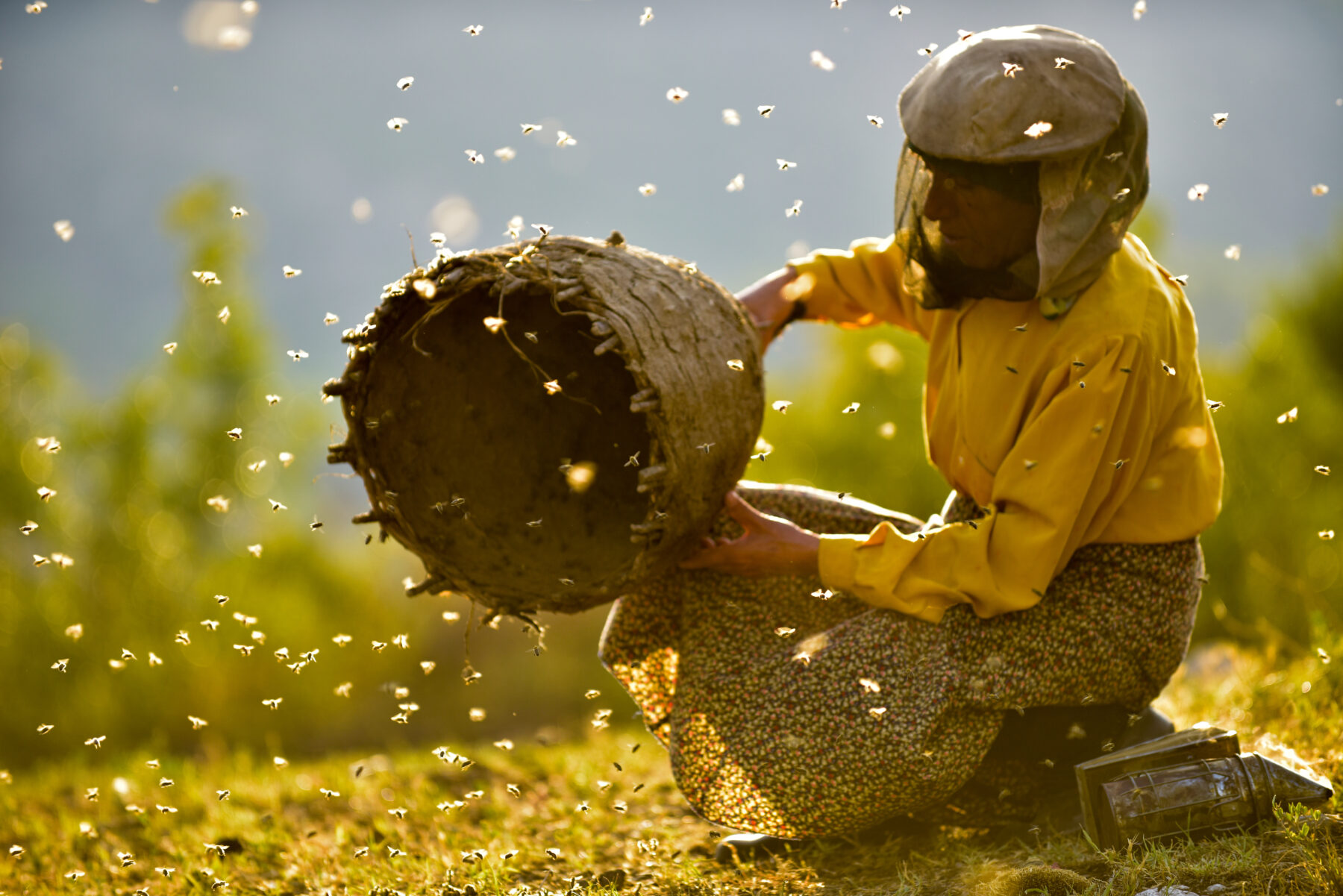The vast majority of us have grown up in a world saturated with consumerism. Everything that is made had to be made, by someone, in some plant or facility or lumber yard or publishing house, resources mined, harvested, gathered, and processed to become natural resources we then use to make all of the things that have to be made. The computer I type on, the instruments playing over the iTunes streaming service, the instruments used to record those voices, the desk I sit at, the chair I sit on… you and me, we are surrounded by a world of things, a world we take and take and take for granted, because it’s the only world we’ve ever known. It’s the law we’ve lived under, the law of production and consumption, a default setting we’ve inherited that wedges open an unfillable hole and insists on more. All of us live in a manufactured world.
Well, almost all of us.
Honeyland: What to Expect
Honeyland is an award-winning documentary released in 2019 and available on Hulu and AppleTV. The film follows Hatidze, a woman who lives with her 85-year-old mother in what appears to be the ruins of a deserted Macedonian village far from the country’s capital, Skopje. Hatidze is a beekeeper with ancient methods that allow her to interact with hives of wild bees without netting or gloves. Her ways respect the relationship of humans and nature, always leaving half of the honeycomb for the bees, and taking half with her. Hatidze occasionally ventures into Skopje to sell her honey and buy fresh fruit to share with her mother.
Her homelife is devoid of electricity. She visits a well to retrieve water. The two women have what they need and don’t ask for anything more. It is a barren, simple, and peaceful world.
Hatidze’s nearly tech-free way of life is disrupted when an itinerant family moves into the deserted village, bringing with them a gaggle of children, tractors and trucks, and 150 cows. They have plans to harvest honey, too, but their methods differ from the way Hatidze has approached beekeeping.
Honeyland magnifies the life of one woman and the beautiful harmony that can exist between humans and the natural world alongside the precarious way our unconscious consumption of more and more can disrupt entire ecosystems.
Finding the Love: Faithifying Your Viewing
Our God is a god who rests. The act of creation in Genesis culminates with a day of rest (Genesis 2:1-4). The fourth commandment God gives to Moses after the Israelites are miraculously delivered from Egypt is to keep the Sabbath, for yourself and for your children and for the foreigners who live among you and for the animals and for the land (Exodus 20:8-11).
Walter Brueggemann writes in his book, Sabbath As Resistance, “Divine rest on the seventh day of creation has made clear (a) that YHWH is not a workaholic, (b) that YHWH is not anxious about the full functioning of creation, and (c) that the well-being of creation does not depend on endless work.”
This gift of Sabbath is in direct contrast to the production-driven, commodity oriented, anxiety generating existence the Israelites knew before. Back in Egypt, Pharaoh was the voice that demanded more, more, more. The more Pharaoh has, the more he expects to get out of his slaves. You will have less to work with and more expected of you. More is never enough.
As much as our world longs for rest and relaxation, it is driven by production. And yet, our God calls us out of that cycle and offers us rest. Jesus tells us, “Are you tired? Worn out? Burned out on religion? Come to me. Get away with me and you’ll recover your life. I’ll show you how to take a real rest. Walk with me and work with me—watch how I do it. Learn the unforced rhythms of grace. I won’t lay anything heavy or ill-fitting on you. Keep company with me and you’ll learn to live freely and lightly” (Matthew 11:30 MSG).
The contrast between Hatidze’s way of life and the family who moves in next door is dramatic. Hatidze has nothing, and yet hers is a life of service, humility, kindness, love, hospitality, care, and rest. She has “Sabbathed” her days; she has made her world one that is filled with hard work, simple pleasures, and deep joys.
The family with all of the cows and the children and the machinery arrives into Hatidze’s world, yelling and screaming and crying, bickering and clamoring for more, more, more. The fruit of their labor is rotten. “But the fruit of the Spirit is love, joy, peace, forbearance, kindness, goodness, faithfulness, gentleness and self-control. Against such things there is no law” (Galatians 5:22-23).
Buying into Pharaoh’s world that demands more, more, more only produces rotten fruit, but when we embrace the rest that God promises us through the gospels and through the story of creation and in the ten commandments, we discover that the good fruits mentioned in Galatians can only arise out of the pause given in Sabbath.
And as we see in Honeyland, all of creation is asking us to surrender our marketing-driven desire for more and give the world a rest, too.
* I highly recommend Sabbath As Resistance: Saying No to the Culture of Now by Walter Brueggemann, where these insights on Sabbath come from.




 Copyright
2026
Root and Vine
Copyright
2026
Root and Vine